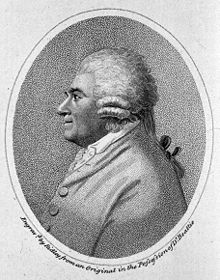James Beattie (poet)
| James Beattie | |
|---|---|
 |
|
| Born |
25 October 1735 Laurencekirk, Kincardineshire |
| Died | 18 August 1803 (aged 67) Aberdeen |
| Occupation | Scholar, poet |
| Nationality | Scottish |
| Alma mater | University of Aberdeen |
| Literary movement |
Scottish Common Sense Realism Scottish Enlightenment |
| Notable works | Essay on the Nature and Immutability of Truth (1770); The Minstrel (1771–74) |
James Beattie FRSE (/ˈbiːti/; 25 October 1735 – 18 August 1803) was a Scottish poet, moralist and philosopher.
James Beattie was born the son of a shopkeeper and small farmer at Laurencekirk in the Mearns, and educated at Marischal College (later part of Aberdeen University), graduating in 1753.
In 1760, he was appointed Professor of moral philosophy there as a result of the interest of his intimate friend, Robert Arbuthnot of Haddo. In the following year he published a volume of poems, The Judgment of Paris (1765), which attracted attention. The two works, however, which brought him most fame were An Essay on the Nature and Immutability of Truth, and his poem of The Minstrel. The Essay, intended as an answer to David Hume, had great immediate success, and led to an introduction to the King, a pension of £200, and the degree of LL.D. from Oxford. The first book of The Minstrel was published in 1771 and the second in 1774, and constitutes his true title to remembrance, winning him the praise of Samuel Johnson. It contains much beautiful descriptive writing.
Beattie was prominent in arguing against the institution of slavery, notably in his Essay on the Nature and Immutability of Truth (1770) and Elements of Moral Science.
Beattie was an amateur cellist and member of the Aberdeen Musical Society. He considered questions of music philosophy in his essay On Poetry and Music (written 1762, published 1776), which was republished several times and translated into French in 1798. His poem "The Hermit" was set to music by Tommaso Giordani (1778).
...
Wikipedia
